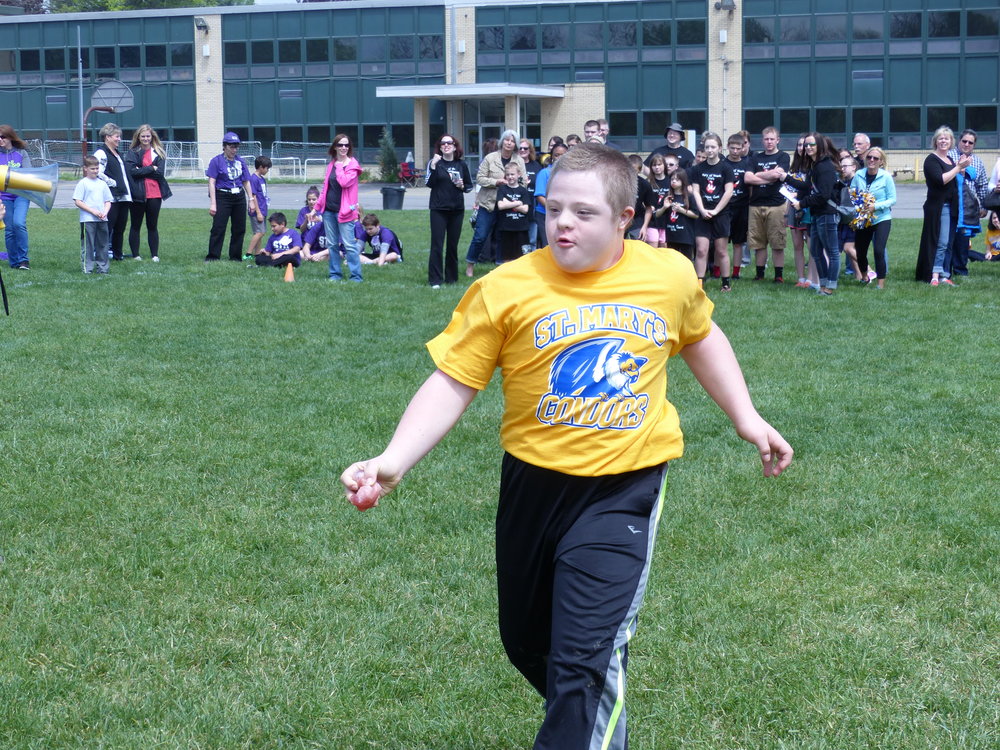St. Anthony’s Kids Find Social Inclusion and Special-Needs Catholic Education in Pittsburgh
Parents whose children have Down syndrome or autism spectrum disorders can obtain a Catholic education that integrates their learning with typical students.

PITTSBURGH — Parents looking for all the benefits of Catholic education for their children with special needs may pray to St. Anthony to help them find what they are looking for. But in Pittsburgh, many Catholic parents who have children with Down syndrome or autism have found the answer to their prayers: St. Anthony School Programs.
For the past 13 years, since kindergarten, Carlo and Dorothy Schiaretta have seen their son Gianfranco, who has Down syndrome, thrive in the program. It’s a Catholic education tailored to his individual needs, and the school’s model has also integrated him and other “St. Anthony Kids” into the regular classrooms of Pittsburgh’s Catholic schools.
Now in his senior year, Gianfranco is taking Advanced Placement Physics, competing in district swimming, learning ballroom dancing and “asking about dating and such.”
“It has been reassuring for us as parents,” Carlo told the Register. He said what sets St. Anthony’s apart is the model of inclusion. He and Dorothy have watched Gianfranco thrive with his peers. For example, in seventh grade, Gianfranco attended St. Mary of the Assumption’s junior-high dance — and confidently showcased his moves on the dance floor amid a large circle of cheering students.
The positive experience made Schiaretta join St. Anthony’s board.
“Grateful is not enough of a word to express what we have in our hearts,” he said.
St. Anthony’s Children
St. Anthony’s began in 1920 as an orphanage that would care for the children of coal-mining families in western Pennsylvania. The mission later changed in 1950, when it became a school dedicated to educating children with Down syndrome.
Jerry Gaughan, CEO of St. Anthony Charitable Foundation, said the school transitioned in the 1980s from what he called a “cloistered” model, where students with Down syndrome were taught in their own building, to an inclusive model, where students with Down syndrome received individualized education plans for their needs as well as classes and activities alongside their peers at Pittsburgh’s Catholic schools.
In 1992, the program began accepting children with autism.
Today, the program operates in four grade schools and three high schools, distributed geographically around the center of Pittsburgh. It also has a post-secondary program in partnership with Duquesne University. In total, the school currently has enrolled 118 students ranging in age from 5 to 22 years old, with a maximum capacity for 130. There are more than 170 graduates.
This partnership with the Diocese of Pittsburgh’s Catholic schools, Gaughan said, helps prepare youth with special needs — as well as their classmates — “to be around all walks of life.”
“It has been a better educational model,” he said.
The program aims to not only provide students with Down syndrome or autism a Catholic education, but also the life skills needed for independent living. In addition to academics, they learn how to cook, do laundry, shop and get vocational training.
According to Gaughan, 90% of the graduates from St. Anthony’s enter the workforce — one alumnus works with the Pittsburgh Penguins NHL hockey team — and others go on to college.
The Catholic faith is at the heart of St. Anthony’s. All students are taught the Catholic faith at every grade level — only six out of 10 students are Catholic — and they attend Mass together every week.
St. Anthony Schools’ CEO Mark Seig told the Register that the teachers also aim to build up students’ sense of self-worth and dignity in an environment that has both “routine and structure,” so that they feel safe and cared for.

“We aim to form the whole child,” he said. The inclusive interaction also helps students with Down syndrome and autism discover they can do many things and are “being looked at [by their peers] as somebody who belongs.”
Seig added of the mission, “We want you to develop into a good young man or young woman when you leave our program.”
Church Evolves on Special Needs
The model of St. Anthony’s was greatly informed by Vatican II's teaching on the dignity of the human person, as well as U.S. bishops’ documents.
The 1978 “Pastoral Statement of U.S. Catholic Bishops on People With Disabilities” condemned society’s “frequent indifference to the plight of citizens” and its “appalling” proposals of abortion or neglect after birth. The bishops stated, “All people have a clear duty to do what lies in their power to improve living conditions for people with disabilities, rather than ignoring them or attempting to eliminate them as a burden not worth dealing with.”
The U.S. bishops founded the National Catholic Office for Persons with Disabilities in 1982 and issued additional statements outlining how the Church must include persons with disabilities in its general life, with the 1995 “Guidelines for the Celebration of the Sacraments With Persons with Disabilities” and the 1998 “Welcome and Justice for Persons With Disabilities.”
“The bishops want us to be able to serve them,” Pam Bernards, director of professional development at the National Catholic Educational Association (NCEA), told the Register. “That vision has been going on since 1965.”
The NCEA is working with Catholic schools to embrace the opportunity of serving children with special needs by developing their professional staff and services. Bernards explained how the NCEA has received many requests from school superintendents for best practices in this area. The NCEA is now working with the Greely Center of Loyola University in Chicago to research what Catholic schools are doing for students with special needs, how well they are providing services and what the needs are.
Fully Catholic Partnership
Gaughan explained that the St. Anthony Schools Program is “completely reliant” on the generosity of supporters. No government money is taken, in order to pursue the Catholic mission without interference. Fundraising covers the $2.5 million needed to run the schools’ operations. While the annual tuition costs $17,500 per student, Gaughan said St. Anthony’s picks up most of that, in order to keep family tuition in the range of $6,000 per year.
He added that the St. Anthony Kids Education Fund distributes more than $300,000 in scholarship money on top of that each year.
The people of the diocese have shown solid support for integrating children with special needs into the school system, according to Bishop David Zubik.
The diocese takes an annual collection for the St. Anthony School Programs, and an annual dinner fundraiser raises money and awareness. The cathedral’s promotion of the program was what informed the Schiarettas, in fact.
Bishop Zubik told the Register that the Church has to be “attentive to the special needs around us.” He pointed out that the programs enrich the lives and learning of children with Down syndrome and autism, many of whom decide to give back by getting involved in their parishes.

For him, the treasure of St. Anthony’s is found “on the faces of the young people.”
“Just to see they are so loved and so accepted — that gives me joy.”
Peter Jesserer Smith is a Register staff reporter.
- Keywords:
- catholic
- catholic education
- catholic students
- diocese of pittsburgh
- peter jesserer smith
- special education
- special needs

















